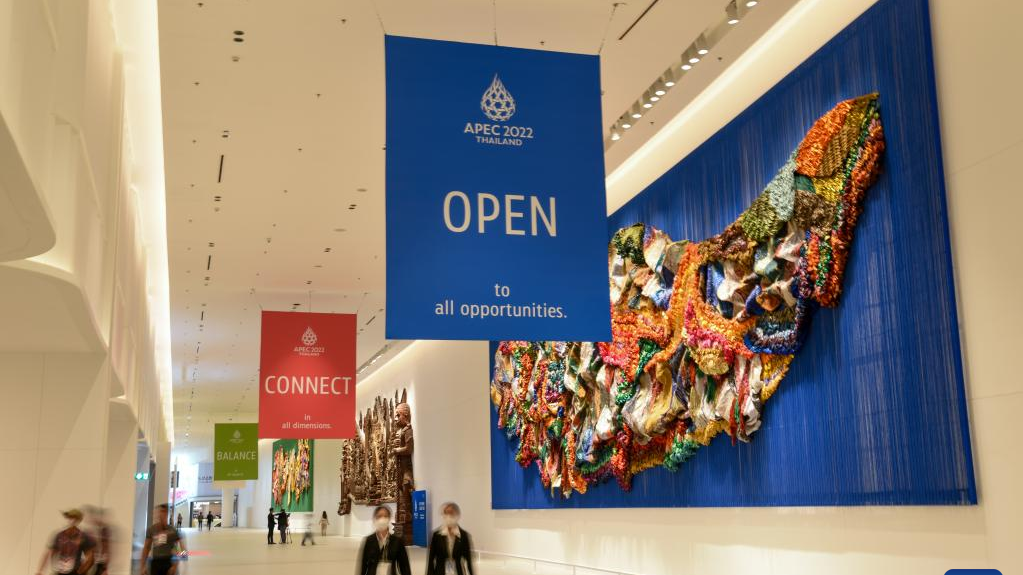
The 29th APEC Economic Leaders' Meeting is held in the Queen Sirikit National Convention Center in Bangkok, Thailand, November 18, 2022. /Xinhua
The 29th APEC Economic Leaders' Meeting is held in the Queen Sirikit National Convention Center in Bangkok, Thailand, November 18, 2022. /Xinhua
Editor's note: Abu Naser Al Farabi is a Dhaka-based columnist and analyst focusing on international politics, especially Asian affairs. The article reflects the author's opinions and not necessarily those of CGTN.
On the eve of the 29th Asia-Pacific Economic Cooperation (APEC) forum, Chinese President Xi Jinping said at the APEC CEO Summit, "the Asia-Pacific is no one's backyard and should not become an arena for big power contests." While drawing on the region's gruesome Cold War past and expounding on China's vision for the region's security and development, Xi added, "no attempt to wage a new Cold War will ever be allowed by the people or by our times."
China, along with the U.S. and the region have spiraled into a hotbed of hostility, "a path of peaceful development," as Xi explained, depends on how current geopolitical tensions would turn out and how Asia-Pacific countries would play their parts over this ominous development.
Despite long-lingering uncertainties, the Asia-Pacific region has maintained relative peace and stability with development and collaboration remaining key priorities. But the region is standing at a precarious crossroad with most countries concerned about losing out on the long-cherished peace and stability path.
They are struggling over longstanding structural economic shortcomings, such as dealing with the impact of the war in Ukraine. The Asia Pacific area has enjoyed a spectacular record for reducing poverty with hundreds of millions of people getting lifted out of poverty in the last two decades.
Additionally, the pandemic has reversed the gains with many of the economic and human development parameters – trade, investment, poverty, unemployment, and so forth – have worsened. According to the Food and Agriculture Organization of the United Nations, there are 640 million poor people in the Asia-Pacific region and the pandemic could soon double this number.

A view shows Queen Sirikit National Convention Center during the Asia-Pacific Economic Cooperation Economic Leaders' Week in Bangkok, Thailand, November 17, 2022. /CFP
A view shows Queen Sirikit National Convention Center during the Asia-Pacific Economic Cooperation Economic Leaders' Week in Bangkok, Thailand, November 17, 2022. /CFP
Asia-Pacific countries require, as Xi pointed out, "working hand in hand to overcome difficulties and obstacles" in a way by which "the Asia-Pacific miracle has been created" in the past decades. They should bolster "the foundation for peaceful development" through higher-standard infrastructural connectivity. But the region lags here.
To build roads, railways, power stations, ports, and clean water systems, the Asian Development Bank estimated that developing Asia would need to invest $26 trillion from 2016 to 2030, or $1.7 trillion per year.
Yet, the region is pursuing a path toward "peaceful development" that hangs on a precarious balance as they must make a hard choice between a zero-sum game and win-win cooperation.
After the Cold War and until the United States shifted its strategic focus toward Asia-Pacific under the pivot to Asia and framed its strategic competition under zero-sum "great power confrontation," this region had experienced an unprecedented economic miracle on every dimension without severe geostrategic wrangling. Nonetheless, the U.S. has moved away from this hard-won, prosperity-generating status quo by stoking division and conflict.
Long since World War II ended, the U.S. sees the Asia Pacific region as its "geopolitical backyard," which was used as a Cold War outpost for its ideological, hyper-confrontational fight against communism. The toxic legacy continues to stoke tensions today, which have boiled over in the Korean Peninsula and with cross-strait tensions over Taiwan.
The tensions between China and U.S. across the Asia-Pacific region is spiraling out from conventional international competition to a more confrontational zero-sum contest. The regional cooperative framework and peaceful security landscape that have reaped unprecedented prosperity, growth, and regionally win-win cooperation are sitting at an uncertain crossroads, which could spark catastrophe the region.
The countries in Asia-Pacific region, drawing on past experiences and lessons, as Xi put it, must "respond [in the right way] to the challenges of the times and steadfastly advance Asia-Pacific regional economic integration" by holding out against any confrontational geopolitical endeavors.
(If you want to contribute and have specific expertise, please contact us at opinions@cgtn.com. Follow @thouse_opinions on Twitter to discover the latest commentaries in the CGTN Opinion Section.)